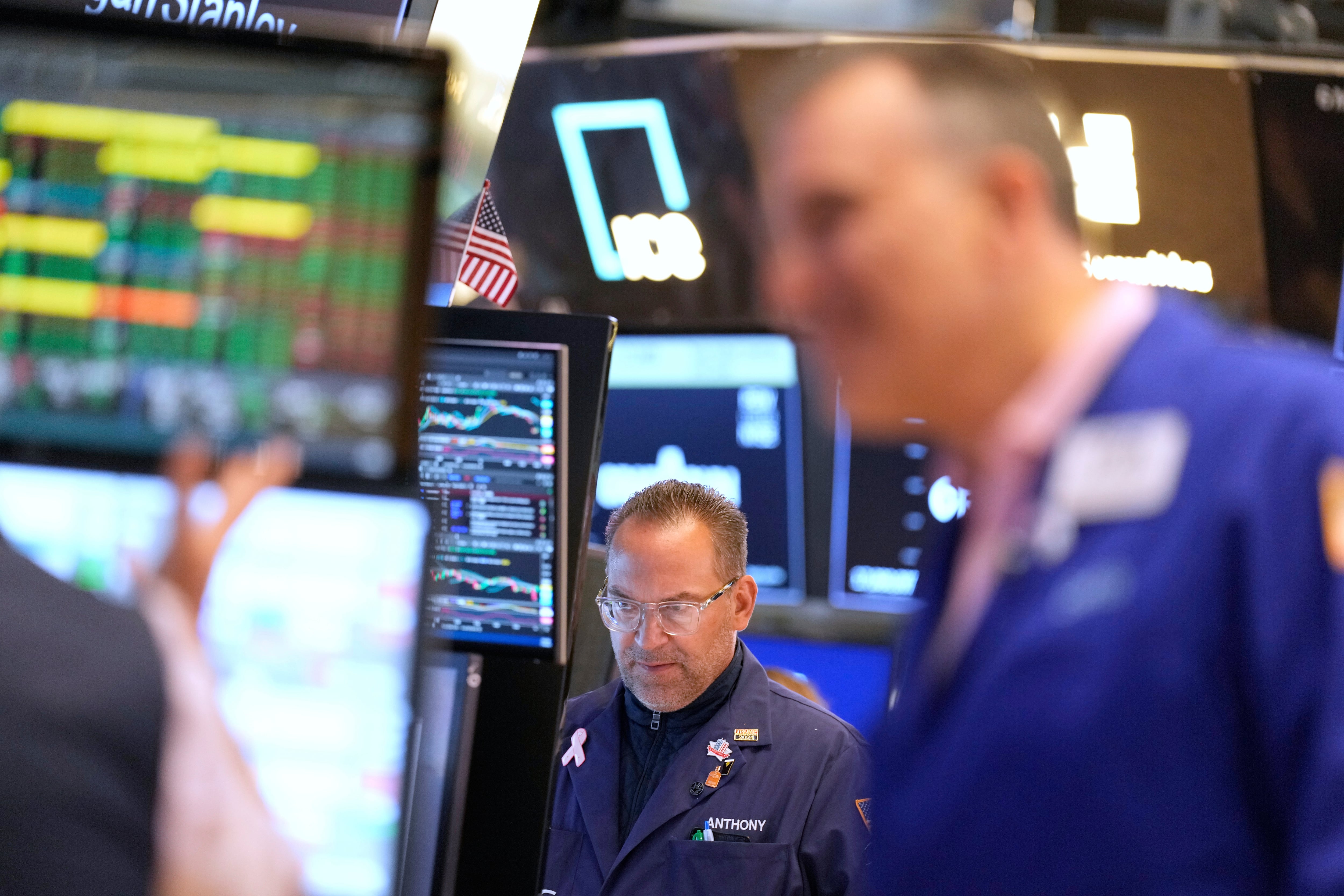NEW YORK (AP) — Wall Street is ticking toward a record on Thursday following some better-than-expected updates on the economy and a mixed set of profit reports from big U.S. companies.
The S&P 500 was up 0.5% in afternoon trading and on track to top its all-time high set a week ago. The Dow Jones Industrial Average was up 252 points, or 0.6%, as of 2:24 p.m. Eastern time, and the Nasdaq composite was adding 0.8% to its record set the day before.
Trading was calmer than Wednesday’s, when President Donald Trump jolted financial markets by saying he had discussed the “concept” of firing the chair of the Federal Reserve but was unlikely to do so. Such a move could help Wall Street get the lower interest rates it loves but would also risk a weakened Fed unable to make the unpopular moves needed to keep inflation under control.
A strong profit report from Taiwan Semiconductor Manufacturing Co. helped drive tech stocks, and its net income soared nearly 61% in the last quarter from a year earlier. The chip maker said it’s seeing strong demand from artificial-intelligence and other customers, and its stock that trades in the United States rose 4.1%.
Other stocks involved in AI also climbed, and a 1.2% gain for Nvidia was one of the strongest forces pushing upward on the S&P 500.
PepsiCo jumped 7% after delivering revenue and profit that topped Wall Street’s expectations. The drink and snack giant also stood by its financial forecasts given in April, which projected lower full-year profit than previous forecasts due to increased costs from tariffs and a pullback in consumer spending.
United Airlines flew 3.8% higher after reporting a stronger profit for the latest quarter than analysts expected. It also said it’s seen an acceleration in demand from customers that began in early July, and it’s expecting less uncertainty about the economy to hurt its business in the second half of this year.
Lucid Group’s stock surged 37.1% after it said Uber is aiming to use 20,000 or more of its vehicles over six years in a robotaxi program. Using an autonomy system by Nuro, it expects to launch “later next year in a major US city.”
Uber, which plans to invest hundreds of millions of dollars in Lucid and Nuro, saw its stock edge down by 0.2%.
On the losing side of Wall Street was Abbott Laboratories, which fell 8% despite delivering results for the latest quarter that edged past analysts’ expectations. The health care company cut the top end of its forecasted range for revenue growth over 2025.
Elevance Health dropped 12% after reporting a weaker profit than analysts expected. It cut its forecast for profit in 2025 because of rising medical cost trends in its Affordable Care Act business, along with other factors.
Also falling were shares of Archer-Daniels-Midland and Ingredion, makers of high fructose corn syrup. Trump said Wednesday that Coca-Cola has agreed to use real cane sugar in its flagship soft drink in the United States at his suggestion, though the company has yet to confirm that.
Ingredion dropped 0.8%, and Archer-Daniels-Midland fell 1%.
In the bond market, Treasury yields held relatively steady following several better-than-expected reports on the economy.
One said that shoppers upped their spending at U.S. retailers by more last month than economists expected. Such spending, along with a relatively solid jobs market, has helped keep the U.S. economy out of a recession.
A separate report said that fewer U.S. workers applied for unemployment benefits last week, which could be a signal of limited layoffs. A third suggested unexpectedly strong growth in manufacturing in the mid-Atlantic region.
Such solid data could keep the Federal Reserve on pause when it comes to interest rates. The Fed has been keeping rates steady this year, after cutting them at the end of last year. The Fed’s chair, Jerome Powell, has been insisting that he wants to wait for more data about how Trump’s tariffs will affect the economy and inflation before the Fed makes its next move.
That’s because while lower interest rates could goose the economy and prices for investments, they would also give inflation more fuel. And prices may already be starting to feel the upward effects of tariffs.
Thursday’s strong economic helped push the two-year Treasury yield, which closely tracks expectations for the Fed, up to 3.92% from 3.88% late Wednesday.
Longer-term Treasury yields were mostly steady, though, and the 10-year yield remained at 4.46% from late Wednesday. The Fed has less influence over these yields, where investors in the bond market carry more sway.
Bond investors had briefly driven longer-term yields higher on Wednesday, when fears were high that Trump may fire Powell. The president has been angrily calling for Powell to cut interest rates, and a less independent Fed may end up keeping short-term rates low in the near term. That, in turn, could allow inflation to run higher in future years.
Longer-term yields then relaxed after Trump said he was unlikely to fire Powell.
In stock markets abroad, indexes rose across much of Europe and Asia.
___
AP Business Writers Matt Ott and Elaine Kurtenbach contributed.









